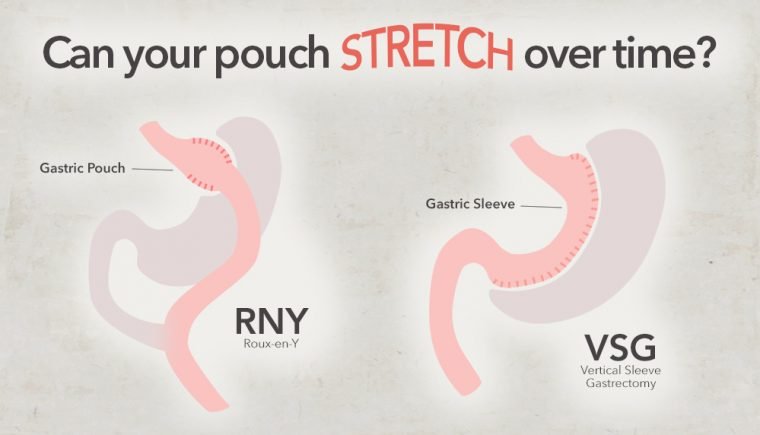Reading Time: 4 minutes

One of the most common questions weight loss surgery patients ask about surgery is, “Will my stomach stretch after surgery?”
Bariatric surgery procedures work through one of two mechanisms: restriction or malabsorption, or a combination of both. Gastric bypass and the gastric mini sleeve both restrict food consumption by reducing the size of the stomach.
How do bariatric procedures shrink the stomach?
Gastric bypass is considered both a restrictive and malabsorptive operation. During the procedure, a small stomach pouch is created, which is then connected to the middle portion of the small intestine, “bypassing” the remainder of the stomach, along with the first portion of the small intestine. Gastric bypass reduces the size of the stomach from the size of a football to approximately the size of a lemon. The smaller stomach pouch limits the amount of food the patient is able to eat. The procedure also limits absorption of calories and nutrients by the small intestine. Gastric mini sleeve surgery reduces the size of the stomach by about 85 percent. During the procedure, a large portion of the stomach is resected and removed. Like gastric bypass, the new stomach pouch created with gastric mini sleeve surgery greatly reduces the volume of food the patient can consume. The part of the stomach that is removed is the portion responsible for producing the hunger hormone, ghrelin, which also aids in reduced hunger.Will the stomach stretch after surgery?
This is an important question to answer for those considering bariatric surgery. The natural stomach stretches as it fills with food and contracts when it is empty. As your stomach expands with food consumption, it sends a signal to your brain to stop eating because it is full. Food in the stomach is then broken down by stomach acid and moved to the intestines where it continues in the digestive process. People who are overweight or obese may overeat beacuse they don’t get the signal that the stomach is full, continuing to stretch the stomach overtime. Over time, the stomach may not send the fullness signal until it is stretched to the brim. On the flip side, it may sends a hunger signal when it is still half full. After gastric mini sleeve or gastric bypass surgery, it is important to avoid overeating, which can lead to a stretched stomach over time. With one meal, the stomach stretches and contracts as it should, but eating too much food regularly puts you at risk of permanently stretching the stomach, skewing the signals of hunger and fullness sent to the brain and leading to weight regain after bariatric surgery.Can stomach stretching after bariatric surgery be prevented?
Bariatric patients are instructed to follow a strict post-op diet to avoid permanently stretching the stomach after surgery. In addition to the restricted diet, here are a few pointers to help prevent stomach stretching. Eat only small meals. Immediately after surgery, the stomach can only hold about two to four tablespoons of food or drink. Over the next year, it will expand to hold about 16 tablespoons of food or drink, still much less than you were ever able to eat before surgery. Keep all meals and snacks small to prevent permanent stomach stretching. Do not drink with meals. Weight loss surgery patients should avoid drinking anything within 30 minutes of mealtime. Because stomach capacity is so limited, it is important to be able to fill the stomach with only food at meal time. Stop eating before you are full. Learn to listen to the signals your stomach sends your brain and stop eating before you feel full. Keep in mind that every bite takes some time to get to your stomach, so if you wait to take your last bite until you feel full, you may actually overeat. Add in small snacks if you are hungry. If you feel hungry between meals, eat a small, healthy snack to help keep you satisfied. This way you won’t be tempted to overeat at mealtime.Can the stomach pouch be reset?
Don’t be discouraged if you find yourself overeating. It is never too late to get back on track with your weight loss diet. When weight loss stalls, many patients find success with a 10 day reset diet, which helps to reset the stomach to its appropriate size by severely limiting food intake, beginning with three days of liquids only, then adding in pureed foods, soft foods and eventually healthy whole foods. Click here for an example of a 10 day pouch reset diet. It is suggested that this diet is done under the supervision of your weight loss surgeon or dietitian. If the pouch reset doesn’t work, or the patient continues to gain weight after bariatric surgery, surgical revision surgery is another option to help the patient get back on track and begin losing weight again. The goal of a bariatric revisional procedure is to modify the original procedure to a different mechanism. For example, patients who have previously had gastric bypass surgery may choose to have a bypass-to-sleeve revisional surgery. The most effective options for gastric sleeve revision are revision to gastric bypass or duodenal switch (gastric sleeve and intestinal bypass). Original lap band procedures may be revised to gastric bypass or gastric mini sleeve. Band-to-sleeve revision is the most common weight loss revisional procedure chosen by gastric band patients. If you are considering weight loss surgery, or you are concerned that your stomach has stretched after a bariatric procedure, contact the weight loss doctors at First Baptist Medical Center today to schedule an appointment.




